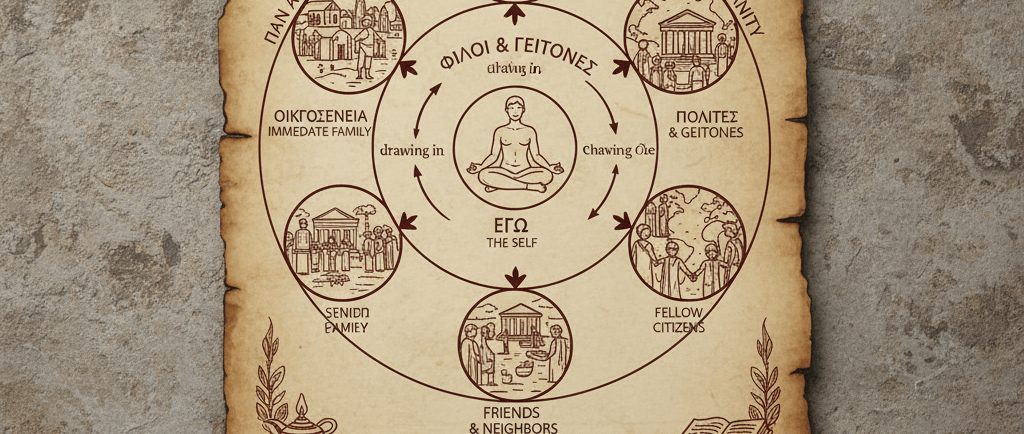Hierocles’ Circles of Concern: Stoic Ethics in Practice
Imagine for a moment that your sense of care and responsibility radiates outward like ripples from a stone dropped in water. This is exactly how the ancient Stoic philosopher Hierocles explained human connection and ethics almost 2,000 years ago. His idea, known as the Circles of Concern, gives us a practical guide for living with empathy, reason, and moral clarity—a Stoic principle that feels timeless in our fast, self-centered modern world.
STOICISM
11/1/20252 min read


The Stoic Vision of Connection
Stoicism teaches that we are all part of a greater whole—a rational universe bound by nature and reason. While each person is responsible for their own thoughts and actions, our moral duty is to live in harmony with others, contributing to the common good. Hierocles took this broad idea and made it visual.
He asked us to picture several concentric circles:
At the center stands you—the self.
The next circle includes your immediate family.
The following circles expand to extended family, local community, fellow citizens, and eventually all humankind.
The Stoic task, according to Hierocles, is to bring those outer circles closer inward—to treat distant people with the same goodwill and care we offer to those nearest to us.
How to Apply the Circles in Daily Life
While the Circles of Concern might sound abstract, they offer actionable Stoic exercises:
Start small. Practice kindness with those you interact with daily—family, co-workers, or strangers. Every act of empathy moves the outer circle slightly inward.
Reflect regularly. Ask yourself: Who am I excluding from my concern today? Stoic journaling helps recognize emotional bias or apathy.
Expand perspective. Before acting, consider how your decisions affect the wider world—your city, the planet, or future generations.
Use rational empathy. Stoicism doesn’t ask for blind emotion but reason-guided compassion. See others as fellow humans sharing the same capacity for virtue and struggle.
Why This Ancient Idea Still Matters
Modern life often encourages disconnection—online bubbles, competition, and polarized views. Hierocles reminds us that ethical living begins with awareness of interdependence. The Circles of Concern form a moral compass for the Stoic practitioner, helping balance self-development with social responsibility.
In workplaces, communities, or global issues like climate change, this Stoic framework nudges us to think: How can I extend my concern beyond myself while staying anchored in reason?
The Bridge Between Self and Society
Stoicism is not isolation—it’s active citizenship rooted in self-mastery. By expanding our circles, we blend inner virtue with outer compassion. Hierocles’ circles teach that ethics isn’t about guilt or self-sacrifice—it’s about alignment with nature’s rational order, where every person plays a part in humanity’s collective good.
In a world craving empathy, Hierocles offers a timeless blueprint:
Start with yourself, then keep bringing others closer.
Waste no more time arguing about what a good man should be. Be one - Marcus Aurelius
We suffer more often in imagination than in reality - Seneca
Wealth consists not in having great possessions, but in having few wants - Epictetus
